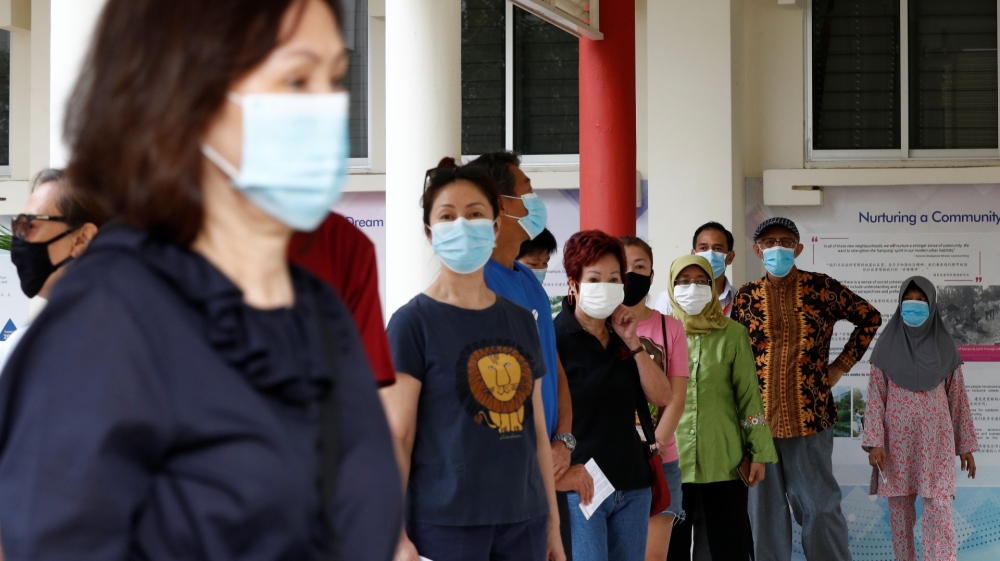Singaporeans vote in snap election under coronavirus cloud
Queues formed early outside polling stations with strict conditions enforced to curb the risks from coronavirus.

Singaporeans started voting in a snap on Friday election with the ruling People’s Action Party (PAP) looking to shore up its dominant position on the island it has governed since independence in 1965.
Prime Minister Lee Hsien Loong called the election on June 24, saying the PAP, which had 83 of the 89 seats in the last parliament, needed a fresh mandate in order to take Singapore through the economic fallout caused by the coronavirus pandemic.
Keep reading
list of 4 items‘Absolute power’: After pro-China Maldives leader’s big win, what’s next?
Solomon Islands pro-China PM Manasseh Sogavare fails to secure majority
Pro-China party on course for landslide victory in Maldives election
“Do not undermine a system that has served you well,” the 68-year-old said on the campaign trail.
Many of the earliest voters were the elderly, who were advised to vote when polling stations opened at 8am (00:00 GMT) under strict conditions imposed as a result of the coronavirus.
Everyone is required to wear masks, and voters are expected to spend no more than five minutes in a polling station, where they must scan their identity cards, sanitise their hands and put on disposable gloves before receiving a ballot paper. Singapore has 2.65 million eligible voters.
COVID-19 patients and those under quarantine cannot vote, but a mobile polling team will bring the ballot box to the rooms of Singaporeans who have recently returned from overseas and are in isolation at hotels.
Polls open in #Singapore general elections – @AFP pic.twitter.com/rUoWLnPESx
— Satish Cheney (@SatishCheney) July 10, 2020
Singapore is not the first country in Asia to hold elections during the pandemic – South Korea held parliamentary elections in April – but strict conditions related to the virus have further constrained campaigning.
Strict rules
Candidates had to adhere to social distancing rules limiting groups to five, and avoid shaking hands or fist bumping. Mass rallies – often attended by thousands and a key platform for opposition parties – were banned. Instead, candidates went online, livestreaming discussions that generally failed to match the excitement of the rallies.

The polls are being seen as a measure of approval for both the government’s response to the coronavirus crisis and the PAP’s next generation of politicians since Lee, who has been prime minister since 2004 is expected to retire in the coming years.
Opinion polls are banned during the election campaign, but the poll results will be closely watched as even small shifts in popularity can lead to major policy changes.
#GE2020: It’s drizzling in some parts of Singapore but many voters are out bright and early to cast their vote. Many of those first in line are senior citizens who have recommended voting time bands between 8am and noon https://t.co/Lwv1n87he8 pic.twitter.com/gwHWuaqMs3
— CNA (@ChannelNewsAsia) July 10, 2020
When concerns about immigration and jobs flared in 2011, the PAP polled a record-low 60 percent of the vote and tightened rules on hiring staff from overseas to address voters’ sensitivities.
With the country now facing its deepest-ever recession as a result of the coronavirus, those concerns are once again in voters’ minds.
“I think it’s OK to vote during a pandemic because the conditions aren’t that severe at this point and all necessary precautions are being taken,” said Malini Nathan, 42, a communications executive.
“Issues I am concerned about are healthcare, job security and retirement,” Nathan said.
Lee vs Lee
A move by Lee’s estranged younger brother Lee Hsien Yang, who once helmed the country’s top telecommunications company, to join one of the opposition parties added some excitement to the campaign.
The two fell out in a simmering feud over the fate of their father’s home.
“Voting for the opposition is the safest choice for Singapore,” Lee, who decided not to run as a candidate, wrote in a Facebook post this week. “It’s not ‘rocking the boat’ but saving our boat from sinking.”
Sample counts are expected soon after the close of polls at 8pm (12:00 GMT) with final results due in the early hours of Saturday.
The city-state has one of the lowest COVID-19 fatality rates in the world, and earned early praise for its containment efforts.
However, after mass outbreaks emerged in the cramped dormitories that are home to the thousands of migrants who work in construction and other low-paid jobs the government imposed a renewed lockdown, which it called a “circuit breaker”.